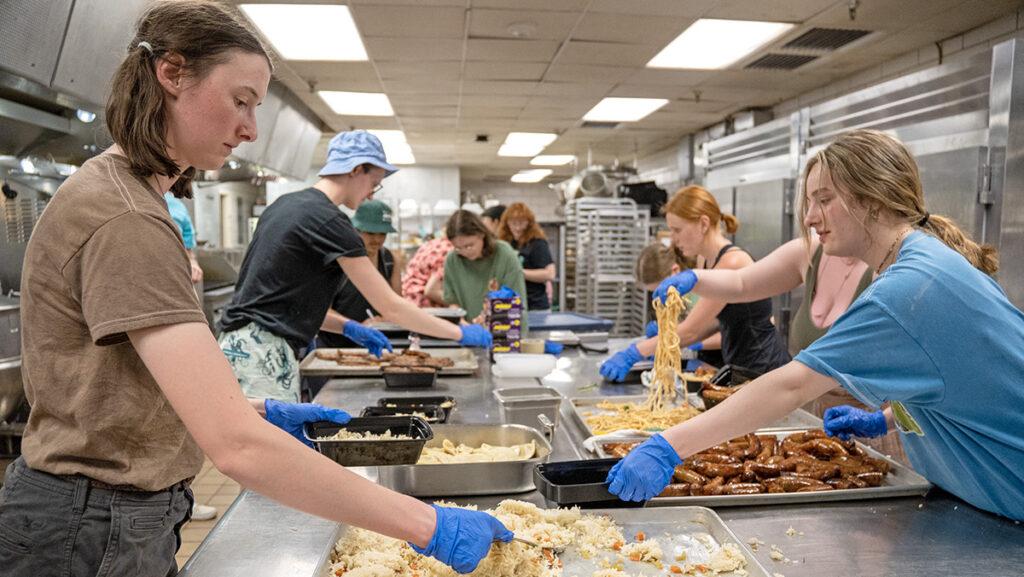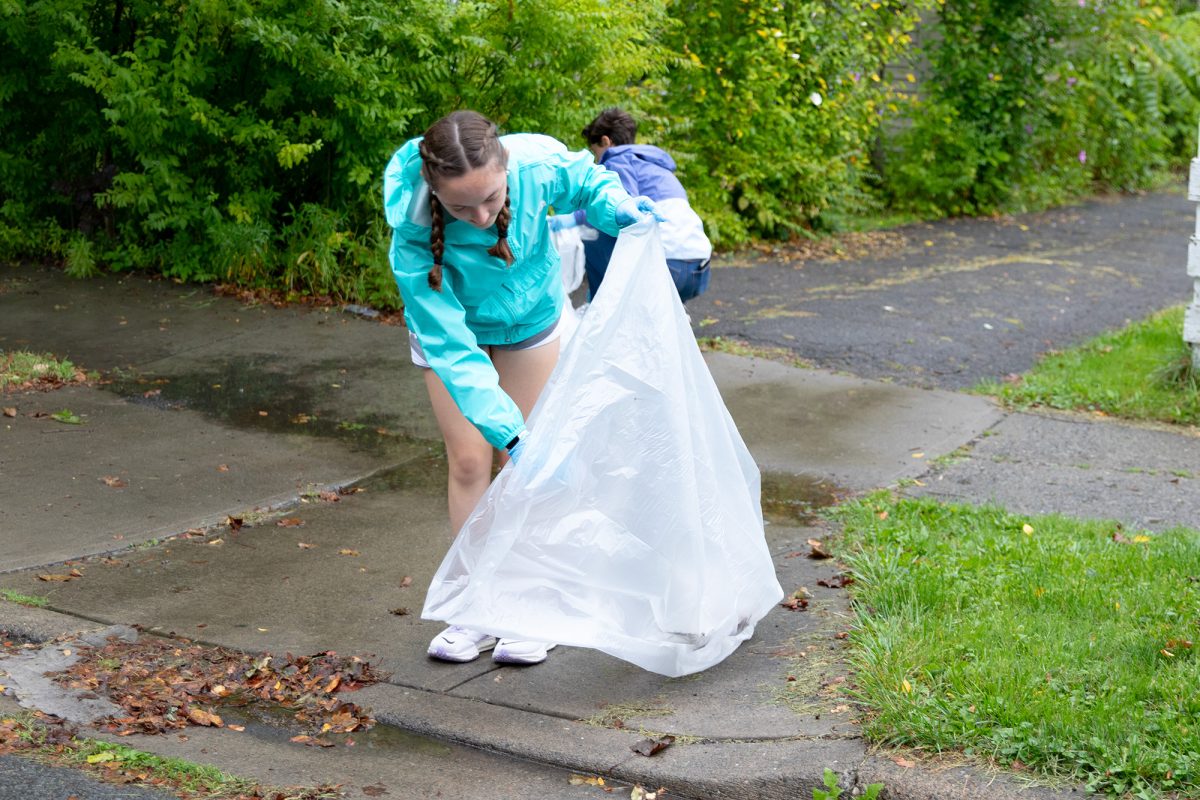Since March 31 and continuing for every Friday for the rest of the semester, Ithaca College students can go to the back of the Campus Center Dining Hall kitchen and help the Eco-Reps — an organization that informs the campus community about sustainable lifestyles — to scoop, weigh, package and label leftover food to donate to the Friendship Donations Network.
The Friendship Network, located at 1013 W State St, is fully run by volunteers in the Ithaca area who help collect food donations and deliver them to homeless shelters, motels and places where people are in need of food.
Alicia Menduni, project coordinator and treasurer for Eco-Reps, reorganized the club’s weekly food donation event after the club stopped collecting donations because of COVID-19.
Menduni did a food collection project as an Innovation Scholar in her first year at the college, which sparked the idea for the Eco-Reps event. Their last event April 14 had three Innovation Scholars — sophomores Aiden Connor and Nandini Agarwal and first-year Payton Romance — help with the food collection.
“We decided that recovering food from the dining halls would be a great thing to do because there had been a project in the past, but that kind of fell apart,” Menduni said. “Then I got a job with the dining hall and through contacting my supervisor, we were able to arrange the whole project and work with the Friendship Donations Network.”
David Harker, director of the Center for Civic Engagement, said the college has been working with the network since 2017. He said the college has a strong connection with the network and that students have volunteered, interned and done research projects with the Friendship Network.
“It’s really exciting,” Harker said. “This was a really awesome next step to meet the sustainability goals of reducing food waste and keeping things out of the landfill, reallocating resources that would have been used on wasted food and feeding folks who need the food.”
Harker said there are similar organizations surrounding Ithaca, like the Salvation Army of Binghamton, Feeding New York State in Albany and the Fulmont Community Action Food Bank in Fonda, but they do not compare to the organizations in the City of Ithaca.
“What’s great about Friendship Network is that they help us answer the question of, ‘How do we get this food from IC that would otherwise go to waste and be where it can be used?’” Harker said.
Harker said the network has connections with grocery stores like Wegmans, GreenStar and Tops for food collection, which donate leftover food. For food distribution, he said the network looks at where the food is coming from and who is in need in the Ithaca area.
“[The network volunteers] have to focus on the after-school programs and community organizations or events happening that can really utilize this food and make sure it goes to people who need it,” Harker said.
April 7 was the second food collection event of the semester and packaging event for Eco-Reps. Five volunteers helped package 189 meals, according to the club’s Instagram.
Menduni said the donation events are at 7:45 p.m. every Friday in the Campus Center kitchen. She said that at the April 14 event, which had four volunteers, it took an hour and a half to collect and package the leftover food that CCDH employees set aside after the dinner shift.
“It’s still pretty new, but it was very successful,” Menduni said. “We’re always looking for more volunteers to help pack.”
Because of the CCDH being understaffed and COVID-19 getting in students’ way, Menduni said the food collection and donation initiative took some time to organize. After getting a job at the dining hall, Menduni said she had firsthand experience of how leftover food is dealt with.
“Last semester we were trying to implement the initiative,” Menduni said. “Having a job there helped with the insider perspective. I was able to see what we were able to do. There was plenty of stuff we could do without putting a burden on the dining hall employees.”
Agarwal weighed the trays of food during the April 14 event because it is required by the Bill Emerson Good Samaritan Food Donation Act. The act states that donated food must be labeled and fit federal, state or local regulations of freshness, age, size and other conditions. Agarwal said the event is a fun way to donate time while helping to donate food.
“I feel calm with the numbers,” Agarwal said. “I’m having fun, honestly. It’s very satisfying. I’ve enjoyed my fair share of scooping too.”
Menduni said the number of volunteers continues to grow each Friday and more and more food is given to them to repackage and donate.
Senior Kelly Warren, program manager of Eco-Reps, said the entire process is fast and easy and that the volunteers were able to package 91 meals from the leftover food during the first event. Warren said each packaged container is enough for one meal.
“It’s a really easy process,” said Warren. “Anyone can do it. … If there’s more people, I’m sure it will be faster and you can set up an assembly line situation.”
Warren also said that in future events, the club will have representatives from Eco-Reps meet the volunteers at the dining hall doors to be let in and show the process of packaging meals.
The main cause for food waste at colleges is no financial penalty for not finishing a meal because many colleges and universities do not charge money for eating in a dining hall, according to a 2021 study by the National Library of Medicine.
In a 2020 study by Temple University’s Hope Center, which serves the campus by researching methods of advocacy and ensuring students have their basic needs met at colleges and universities across the country, one in three students reported not having enough food to eat.
Up to 30–40% of the food supply in the U.S. goes to waste, according to the FDA. In 2010, this was about $161 billion and 133 billion pounds of wasted food. Wasted food is a major reason for carbon emissions, emitting more carbon than 37 million cars, according to the Natural Resources Defense Council.
Harker said the food collections made by Eco-Reps, this year and years before COVID-19, have been a necessary piece of stopping food insecurity within the City of Ithaca. In a Feeding America article published in 2018, 10,720 people in Tompkins County have dealt with food insecurity. The Friendship Network sends meals to over 2,000 people in need, according to a Tompkins Weekly article.
Almost 5% of food that cannot be donated is put into compost compared to the over 59% that goes into landfills, according to the Environmental Protection Agency. The compost bins can be found near the Circles Community Center and are free for anyone to drop their food scraps in.
“I think it’s great because obviously every college and university has a problem with food surpluses and food waste in general,” Warren said. “I’m sure every student at Ithaca College has noticed how much food waste is produced at the dining halls. This is just a great way to eliminate some of that instead of it going to landfills, contributing to our climate crisis.”









